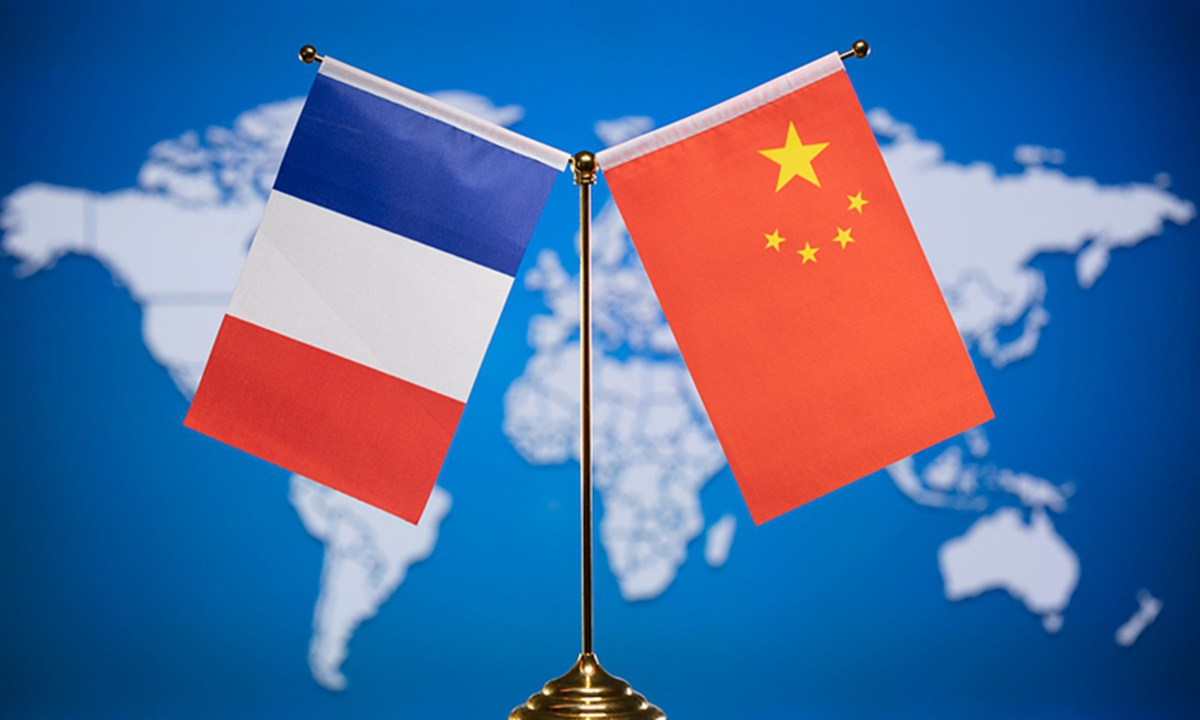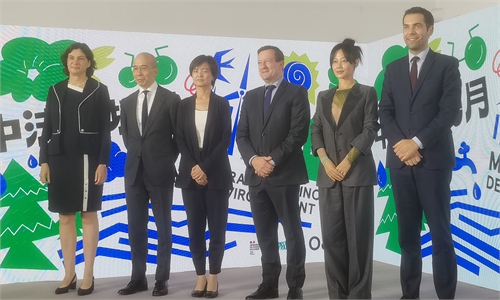Finding global governance solutions requires China, France to play an exemplary role

Photo: VCG
Editor's Note:
China and France, as two old civilizations with a lengthy history, could set an example for the rest of the globe. "The world is currently facing many challenges, and finding solutions requires China and France to play an exemplary role. Instead of making arbitrary judgments to deny each other, we should engage in heartfelt communication and cultural exchange," Eric de La Maisonneuve (Maisonneuve), a French scholar, said recently in a talk with Wang Wen (Wang), a professor and executive dean of Chongyang Institute for Financial Studies at Renmin University of China. The following is an abstract of their recent conversation in Beijing.
Wang: I have many French friends. I have noticed that France, and Europe in general, lacks a sufficient understanding of China, particularly regarding the changes that have taken place in the country over the past 5 to 10 years. During the past decade, China has undergone significant transformations in at least four aspects, which are not well known by France, or Europe. Firstly, the anti-corruption efforts within the Communist Party of China have made significant progress. The Party is now more organized and disciplined than before. Secondly, China has made great strides in the low-carbon industry, positioning itself as a leading force in global carbon emissions reduction. Over 90 percent of the world's photovoltaic industry and over 70 percent of new energy vehicles are produced in China. While Europe has been vocal about reducing carbon emissions in recent years, the actual actions taken have been relatively limited.
Thirdly, China's society has achieved more equal development, including targeted poverty alleviation and the emergence and popularization of the digital economy, which have promoted equal access to social services. In China, services such as food delivery, ride-hailing and home cleaning, which rely on mobile internet, are very affordable, allowing middle-income and low-income individuals and ordinary people to enjoy excellent social services. Consequently, Chinese people are less frustrated and more satisfied. In comparison, the social situation in Europe in recent years has been somewhat lacking and unimpressive.
Lastly, both France and Europeans did not expect that China's foreign strategy would become clearer and more transparent. The world didn't know what China wanted over a decade ago, but now China has clearly stated to the world what it wants.
Maisonneuve: I think you are absolutely right. I believe that the French people are not very aware of these four points you just mentioned. And I think there may be even more changes. In fact, I grew up with the ideology that the Western civilization is the dominant civilization in the world, and at that time, it was indeed the case. However, after coming to China, I discovered that the Chinese civilization may be another option worth analyzing. My perspective on the world has changed. There are many ways to observe the world, and each of them has its own rationality.
In the face of two different ways of viewing the world and governing society, the first choice is to accept and acknowledge that we are different but not opposed to each other; rather, we are complementary and capable of progressing together. The second choice is to refuse to accept this difference and seek to overthrow the other side.
I chose the first approach, but most French people do not understand it. I think the root of this problem may extend beyond the diplomatic level and rise to a philosophical level.
I think of Laozi, as well as Plato and Aristotle in the West. They lived in the same era but were unaware of each other's existence, and their lives were thousands of kilometers apart, yet they had similar thoughts. Now that we are so close and even know each other, why can't we think similarly? The French diplomatic system is a bit outdated now, and it may even be a century behind. The system is unable to handle the relationships between countries and humans.
No one can entirely win in this ideological zero-sum game. Hence, there is no way out. Therefore, we need to find a new way. I firmly agree with some Global South nations that believe the current global governance structure is no longer appropriate for this time period, but what we need to do is change it rather than topple it. Therefore, it is important for us to find a completely new path. One effective way is to have more communication and exchanges, just like what we are doing today.
Wang: I completely agree with your views, but I am confused as to why there are still so many noisy voices in public opinion in France. Of course, France is still better off compared to Germany. Why is there denial of China's experience, ignorance of Chinese history, Chinese solutions and Chinese wisdom in Europe? China has contributed to the improvement of global governance with its solutions. However, it seems that in recent years, Europe has been rejecting China and ignoring Chinese ideas.
Maisonneuve: Regarding the situation you just mentioned, I think both sides may have problems. The premise of communication is humility, and both sides may have been a bit clumsy in their approach. Our two countries should engage in more, cultivating a "friendship between gentlemen," as Confucius said.
Once, when I attended a banquet at the residence of the Chinese ambassador to France, former French foreign minister Hubert Védrine was also present. I suggested to him that it would be better for China and France to start their exchanges not from a political and economic perspective but from a cultural and philosophical perspective. Both China and France have many academies, so I suggested organizing a China-French research institute and inviting 20 top Chinese thinkers and 20 top French thinkers to be in a room for a day to have closed-door discussions. I believe that this kind of exchange of wisdom and culture can establish a good foundation for deeper communication in the future.
The world is currently facing many challenges, and finding solutions necessitates the exemplary role of China and France. Despite the significant differences in population and size between our two countries, we also share many commonalities. We are both ancient civilizations and should become leaders to calm down the chaos in the world. Instead of making arbitrary judgments to deny each other, we should engage in heartfelt communication and cultural exchange. Failure to achieve complementarity in the current world will only result in mutual destruction.
Wang: I am younger than you, but I also feel a tremendous sense of crisis. I once wrote an article in which I referred to the present moment as a time of "five parallel disasters" (war disasters, climate crises, economic crises, social crises and the revolution of intelligence), which is the most dangerous time since World War II. It is extremely rare in human history for these five disasters to occur simultaneously. What's even worse is that, in the face of so many disasters, humanity has not united. China, the US, France, Germany and Europe have not come together but are engaged in endless conflicts, which is deeply regrettable.
Maisonneuve: I believe that climate change is inevitable. We cannot prevent humans from breathing, living, and using certain resources, but we should adapt to it. For example, using human wisdom, including the wisdom of artificial intelligence, to clean the oceans, reduce emissions and mitigate climate change from various aspects. In fact, humans have experienced climate change in the past; in history, we have experienced extreme cold and extreme heat.
I have a specific idea in mind, which involves electrification in Africa. Despite significant investments in Africa, the progress of electrification in the continent has been slow. For instance, during my visit to the Congo, I witnessed the abundance of water resources. If China, France and Europe can cooperate to establish a fund to jointly develop water resources and promote electrification in Africa, I think it would be a good way to reduce emissions, rather than China, the US and Europe competing for market share and engaging in mutual rivalry and defamation.
Wang: You mentioned the suggestion for electrification in Africa. Over the past decade, China has built over 6,000 kilometers of railways, over 10,000 kilometers of roads, more than 80 major infrastructure projects and around 20 ports in Africa. We have done a lot of work in Africa. The suggestion you mentioned about promoting electrification in Africa requires cooperation with France and even the US in practical operations. However, cooperation is currently very difficult, and I feel that both France and the US are guarding against China. How can we overcome these obstacles to improve cooperation?
Maisonneuve: The issue is difficult to solve. From a practical perspective, our political and social systems do have differences, and our ways of viewing the world are also different, which hinders our cooperation. However, I still think that we need to solve this problem on an ideological level. We need to look at it from a more macro perspective of human unity.
I believe that China is a country with strong cultural traditions and family values, but it has also been influenced by the West. However, China has indeed experienced a period of humiliation in modern times. Therefore, China faces a challenge of not returning to the past of humiliation and not completely adopting a Western-style approach. China needs to persist in being China.
Wang: That's right, China is now being itself. We are forging a completely different path from the past and from the West. This path seems to resemble a new civilization. This may sound slightly arrogant, but I am indeed confident in my own country. In my opinion, this new civilization seems to be more advanced than the existing Western civilization.

